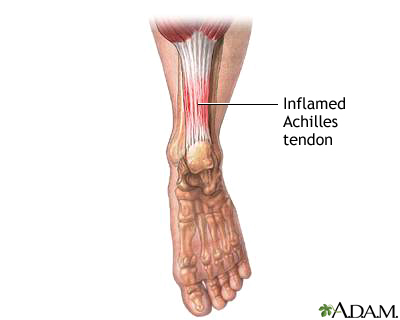
Achilles tendinitis
Achilles tendinitis

Achilles tendinitis is inflammation, irritation, and swelling of the Achilles tendon (the tendon that connects the muscles of the calf to the heel).
Causes
There are two large muscles in the calf: the gastrocnemius and the soleus. These muscles generate the power for pushing off with the foot or going up on the toes. The large Achilles tendon connects these muscles to the heel.
These are important muscles for walking. This tendon can become inflamed, most commonly as a result of overuse or arthritis, although inflammation can also be associated with trauma and infection.
Tendinitis due to overuse is most common in younger individuals and can occur in walkers, runners, or other athletes, especially in sports like basketball that involve jumping. Jumping places a large amount of stress on the Achilles tendon.
Tendinitis from arthritis is more common in the middle-aged and elderly population.
Symptoms
Symptoms usually include pain in the heel when walking or running. The tendon is usually painful to touch and the skin over the tendon may be swollen and warm.
Exams and Tests
The doctor will perform a physical exam and look for tenderness along the tendon and for pain in the area of the tendon when you stand on your toes.
Imaging studies can also be helpful. X-rays can help diagnose arthritis, and an MRI will show inflammation in the tendon.
Treatment
Treatment usually involves:
* Ice
* Nonsteroidal anti-inflammatory drugs (NSAIDs), such as aspirin and ibuprofen
* Rest
* Physical therapy
*acupuncture

You should limit any activities that make the symptoms worse.
Occasionally, a cast, brace, or boot may be used to keep the heel still and allow the swelling to go down.
If these treatments fail to improve symptoms, surgery may be needed to remove inflamed tissue and abnormal areas of the tendon.
Tips for Finding an Acupuncturist
When seeking out a professional acupuncturist, it is important to ensure that the acupuncturist is licensed and certified. Sterilising procedures should be used and more often than not, your acupuncturist will likely use disposable needles. If you are uncomfortable with the idea of needles, an acupuncturist may provide alternatives such as herbal methods, magnetic needles and ear cups. These are thought to provide similar results although are not considered as effective as acupuncture that utilises needles.
Whatever path you take to treating your pain and tendinitis, you can be relieved to know that you have many options, particularly alternative ones such as acupuncture. Hopefully, you will find a qualified acupuncturist who can listen to your concerns about knee pain and begin a treatment plan that provides effective relief.
If you would like to make an appointment please call us on (09) 8150518 or visit us 1054 new north road ,mt albert. if you require more information you may e-mail us at hwenchuan@sina.com
Trackbacks and pingbacks
No trackback or pingback available for this article.
 中文微信:nzacupunctureclinic
中文微信:nzacupunctureclinic
Leave a reply